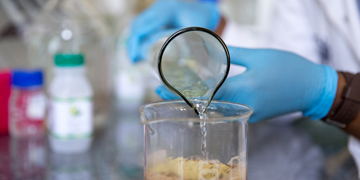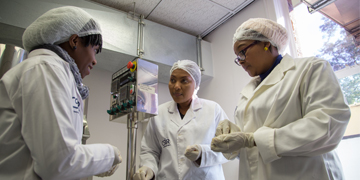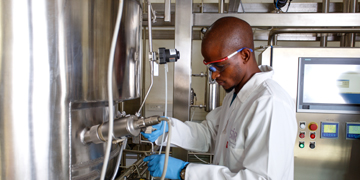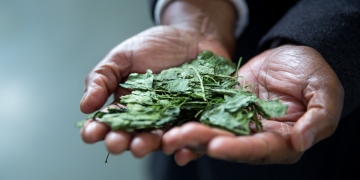Advanced Agriculture and Food
The CSIR harnesses the opportunities afforded by transformative technologies to develop the agriculture and associated processing industries for inclusive growth and rural development, while improving the industry’s competitiveness through research, development and innovation.
The CSIR works across the following key areas:
- Precision agriculture: Leveraging multidisciplinary expertise, including climate modelling, remote sensing, geographic information systems, drone technologies, digitisation, big data analytics, artificial intelligence and machine learning. Tools and services based on these technologies enable better yield predictions, input cost optimisation, decision support and better surveillance for pests and diseases.
- Agro-processing: Optimising South Africa’s biodiversity by formulating high-value products (food, cosmetics, nutraceuticals and African traditional medicines) based on indigenous plants. Developing nutrient-rich, ready-to-eat foods, enriched with plant or insect-based proteins; and reducing post-harvest losses through processing and developing green solutions for post-harvest management.
- Food safety: Improving food safety testing to support the export market and reduce foodborne illness. Expertise leveraged across the CSIR include, blockchain and Internet of Things technologies that enable higher control and traceability to improve supply chain logistics; sensing devices to improve monitoring and rapid on-site surveillance; and routine testing technologies (for mycotoxins, pesticides and pathogens).
The CSIR’s multidisciplinary skills base enables the organisation to support the sector through robotics and sensor technologies, green energy solutions, green packaging solutions, point-of-care diagnostic tools, vaccine development and bio fertilisers. This is underpinned by systems design and thinking such as enabling a circular economy.
Furthermore, in support of the Southern Africa Development Community, the CSIR is hosting the Southern Africa Network for Biosciences (SANBio), a programme of the African Union Development Agency New Partnership for Africa’s Development (AUDA NEPAD). SANBio is a platform for collaborative research and innovation addressing challenges in health and nutrition. For more on SANBio, see www.nepadsanbio.org.
Key partners supporting the CSIR’s work in agriculture and food include the Department of Science and Innovation (DSI); Department of Environment, Forestry and Fisheries (DFFE); Department of Agriculture, Land Reform and Rural Development; Technology Innovation Agency (TIA); Gauteng Department of Agriculture and Rural Development (GDARD); Department of Small Business Development (DSBD); provincial government; private sector companies; non-governmental organisations; state-owned enterprises, universities and research organisations such as the Agriculture Research Council and the National Research Foundation.
International collaborators include Namibia Agronomic Board (NAB); World Trade Organisation (WTO); North Carolina State University and SinnovaTek-USA.










